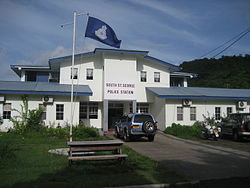| Royal Grenada Police Force | |
|---|---|
 Logo for the RGPF | |
| Abbreviation | RGPF |
| Motto | To Protect and to Serve |
| Agency overview | |
| Formed | 1853 |
| Jurisdictional structure | |
| National agency | Grenada |
| Operations jurisdiction | Grenada |
| Size | 348.5 square kilometres (134.6 sq mi) |
| Population | 124,610 |
| General nature | |
| Operational structure | |
| Headquarters | New Police Headquarters, St. George's, Grenada |
| Sworn members | 940 (out of 1025 permitted by statute) |
| Agency executives |
|
| Facilities | |
| Police stations | 14 |
| Website | |
| Official website | |

The Royal Grenada Police Force (RGPF) is responsible for law enforcement in Grenada. The RGPF enforces criminal, immigration, and maritime laws. It is also held responsible for seaport security and fire services. With 14 police stations and over 940 staff members, the force responds to over 15,000 crimes and incidents per year. Its activities are mandated by the Police Act. [1]
Contents
- History
- Organisation
- Departments
- Education
- Commissioners
- Ranks
- See also
- References
- Bibliography
- External links
The Royal Grenada Police Force also has a paramilitary force, the Special Services Unit, for national defence as well as a maritime security wing, the Royal Grenada Coast Guard. [2]